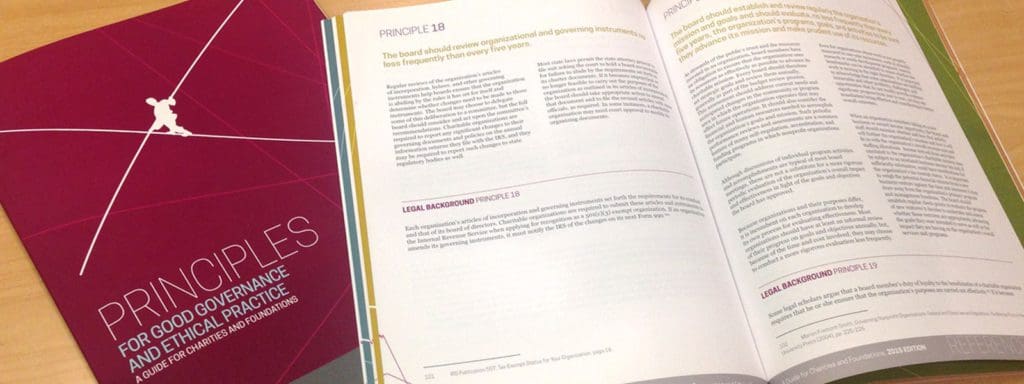It’s been 10 years since Independent Sector first published the first edition of the Principles for Good Governance and Ethical Practice. Following the release of the second edition in 2015, we partnered with Karen Ito, a MPA candidate from the University of Colorado-Denver to help us understand the impact of the Principles and gather stories about how charitable sector leaders are using them to improve their ethical and governance practices. We interviewed Karen to learn more about the research process and her findings, which we will be sharing over the next few months.
ML: You initially reached out to Independent Sector about partnering on research related to ethics. What sparked your interest in this topic?
KI: I’ve worked in the nonprofit sector for most of my career and have seen the tremendous impact charitable organizations have on our society and day to day lives. People trust nonprofit organizations to pursue their missions with integrity, to be responsible stewards of financial resources, and to make decisions ethically and honestly. It is our responsibility to uphold that trust, and I thought this project would be a great way for me to make a contribution to the sector.
ML: Why do you think ethics is such an important topic for the charitable sector?
KI: Especially today, I think people are turning more and more to the nonprofit sector for leadership on a wide range of issues including everything from education to performing arts to climate change to social justice, just to name a few. It is more important than ever that we safeguard the public’s trust in our organizations so that we can continue to bring people together on these important issues. The Principles provide a roadmap for creating and maintaining a culture of ethics.
ML: What were your initial goals for the project? What were you hoping to learn or discover?
KI: My primary goal was to provide Independent Sector with some baseline information about who was using the Principles, how they were using them, and what other resources they thought would be helpful. I knew the Principles guide was an excellent tool, and I was hoping to learn more about how organizations were taking that tool and translating it into meaningful change. One of my goals was to collect stories about how the Principles were being used and what occurred as a result.
ML: What research questions did you land on? And how did you approach tackling them?
KI: The first research question focused on learning more about how many – and what types – of organizations were using the Principles. This information was gathered from an analysis of IS website data. The second question explored how the Principles were being used, and this was addressed through both a written survey, as well as in one-on-one interviews. The survey and interview process also addressed a third question which focused on identifying other types of ethics-related resources or tools that participants thought would be helpful going forward.
ML: What surprised you along the way?
KI: The leaders who participated in this project were incredibly generous with their time and passionate about pursuing ethics work in their own organizations as well as in the broader sector. I was surprised and impressed by how deep that commitment truly is among nonprofit leaders across the country. This is an issue that is important to all of us, and it is something that people really want to talk about and pursue.
ML: You conducted a series of interviews with charitable sector leaders across the country. What was the interview process like, and what did you learn from them?
KI: I interviewed 21 leaders from national federations, statewide associations, foundations, consulting firms, and charitable organizations. Each interview consisted of a standard set of questions, and follow-up questions helped me dig deeper in order to gain a better understanding of the participant’s perspectives, experiences, and recommendations. There is such incredible knowledge and expertise in the sector, and I was continually impressed by the ideas shared in each interview. I learned that one of the most important things we can do to move ethics work forward is to listen first to those working in the field so that we can better understand the challenges they face and the resources they need.
ML: Can you share one insight from your findings that you think the sector should know?
KI: A common theme in many of the stories shared by participants was that an individual came across the Principles and started moving this work forward in his or her organization. That individual may have been a board member, a CEO, or a member of the staff, but it was always someone who decided to take a first step and start the conversation. This is important because it shows that ethics work can be initiated by anyone, and when it is initiated, it results in positive change and leads to a stronger organization. I would encourage those who have not yet reviewed the Principles to download a copy and share it with others. This was the first step in many of the stories that were shared.
Read an executive summary of Karen’s evaluation of the IS Principles for Good Governance and Ethical Practice.



